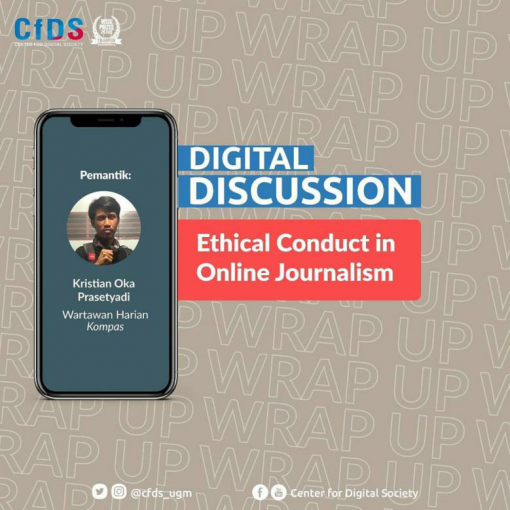
Yogyakarta, 24 Agustus 2020—Center for Digital Society Fisipol UGM is back with the 31-st session of Digital Discussion. In this session, CfDS asked Smart People who are interested in journalism to join in to talk about ethical conduct in online journalism. The discussion was held through a Whatsapp Group with Kristian Oka Prasetyadi, a journalist for Kompas News, as the speaker. This discussion wants to uncover what is the ethical conduct to find sources, conduct an interview, and upload a news credibly and with no misinformation or disinformation.
From the start of the discussion, based on the questions asked by the moderator—Made Agus Bayu Sudharma, Event Assistant CfDS—about things to know about online journalism, it turns out that a couple of the attendees already knew a thing or two about online journalism. Oka agreed with an attendee that said being factual, actual, credible, and neutral is important. “Now, when it comes to ethical conduct in journalism, the truth is it doesn’t change much. Journalists still need to pay attention to accuracy, verify facts, be neutral without any ill intention, respect the privacy and rights of sources, and have empathy,” Oka added.
What is different with journalism now is the use of platforms. It used to use prints, televisions, and radios, but now it shifts to the internet. This change of platform affects the media’s job, because there is an urgency to publicize a news faster and revenue is counted by how many clicks the news got. This also creates another problem; the news is unbalanced because it is produced in a hurry, and it is often not accurate because it is unverified and it was made to be viral.
Oka talked a lot about his experience in being a journalist in the digital era — not in a theoretical sense, but more in a practical sense. He shared his strategy in getting close to the interviewees, how to maximize a certain app, and how to produce news in the rhythm of online journalism. Other than that, he also shared a story that is still relevant to the condition now, which is about things that change for journalists in the midst of the COVID-19 pandemic and its effect.
Related to the topic of journalism in the middle of the pandemic, Oka also talked about “infodemi”. Misinformation and disinformation like “infodemi” can happen because of a couple of factors, such as an unthorough journalist or a journalist that quoted a not credible interviewee. That is why the interviewees need to always verify and make sure that they are accurate — two things that must be a journalist’ priority.
Oka then explained that readers can gain verified and worth-reading news by looking at the name of the media and seeing their reputation. However, Oka reiterated, “Readers still need to be sceptical when gaining information from the media because journalists and interviewees can also make mistakes. So, take any information with a grain of salt.” Oka said to answer one of the attendees’ questions about how to verify information as a reader.
A verified news is also important if a journalist quoted other news. Of course, after quoting, a journalist has to write down the source of the information. The source of the information also needs to have a good reputation, the same procedure needed for readers who want to check for the credibility of a news.
Because of the limited time, Digital discussion can only do the question and answer session for one time which was held in the middle of the material presentation. “The journalist world in the online era is even harsher than before, especially in the era of pandemic. We not only compete with other media, but also with other parties who can hook citizen’s attention through social media. But, I believe that the media is always needed. The public needs accurate, verified, and unbiased information so that discussion can be made to achieve progress,” Oka said before the discussion officially ended at 9.30 pm.
